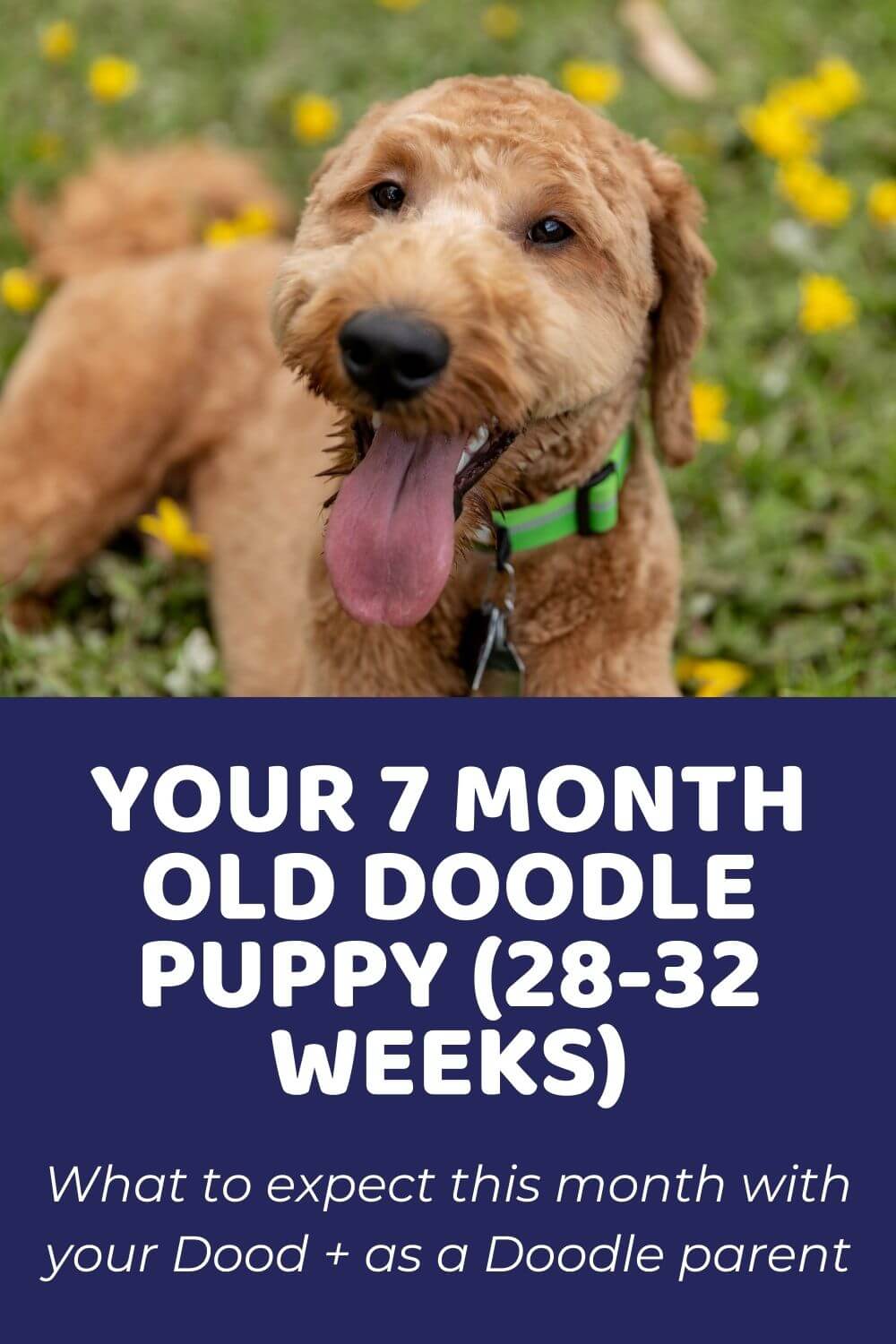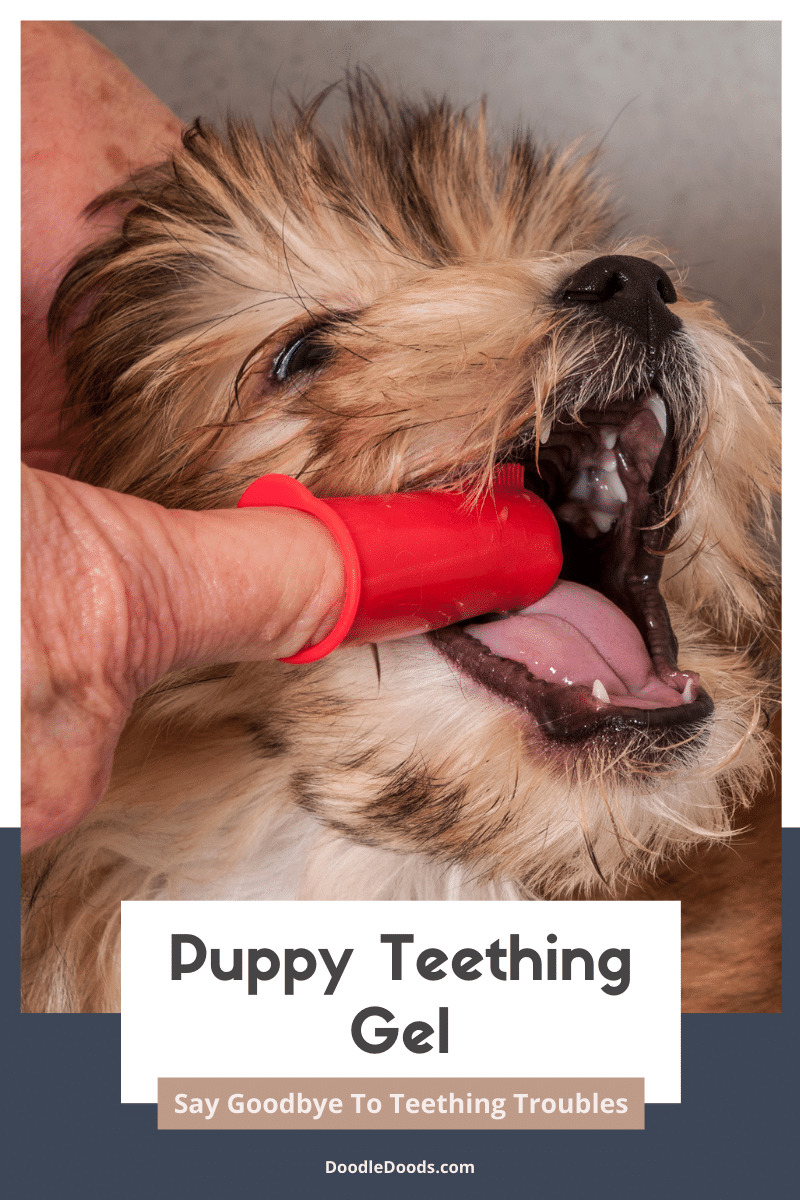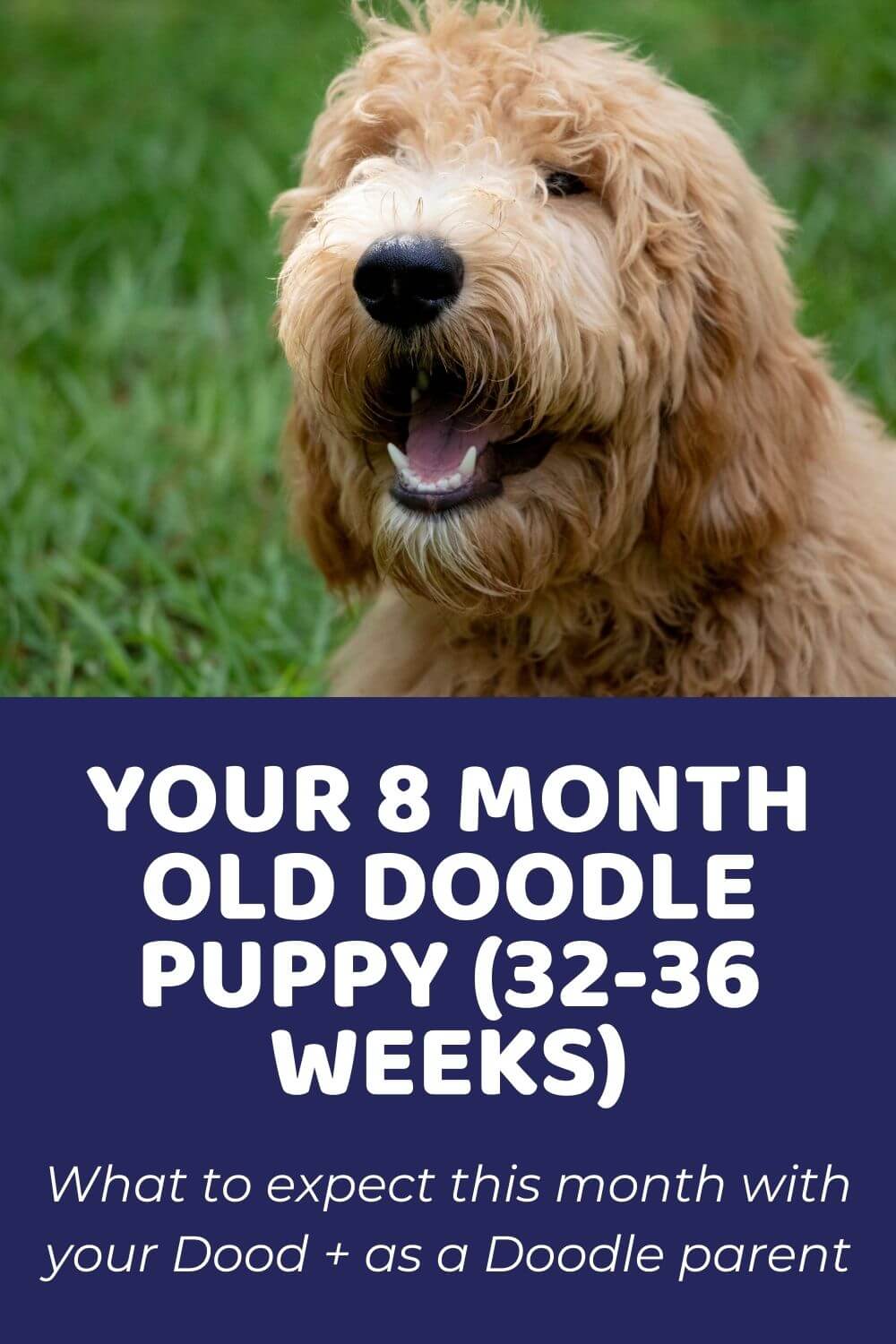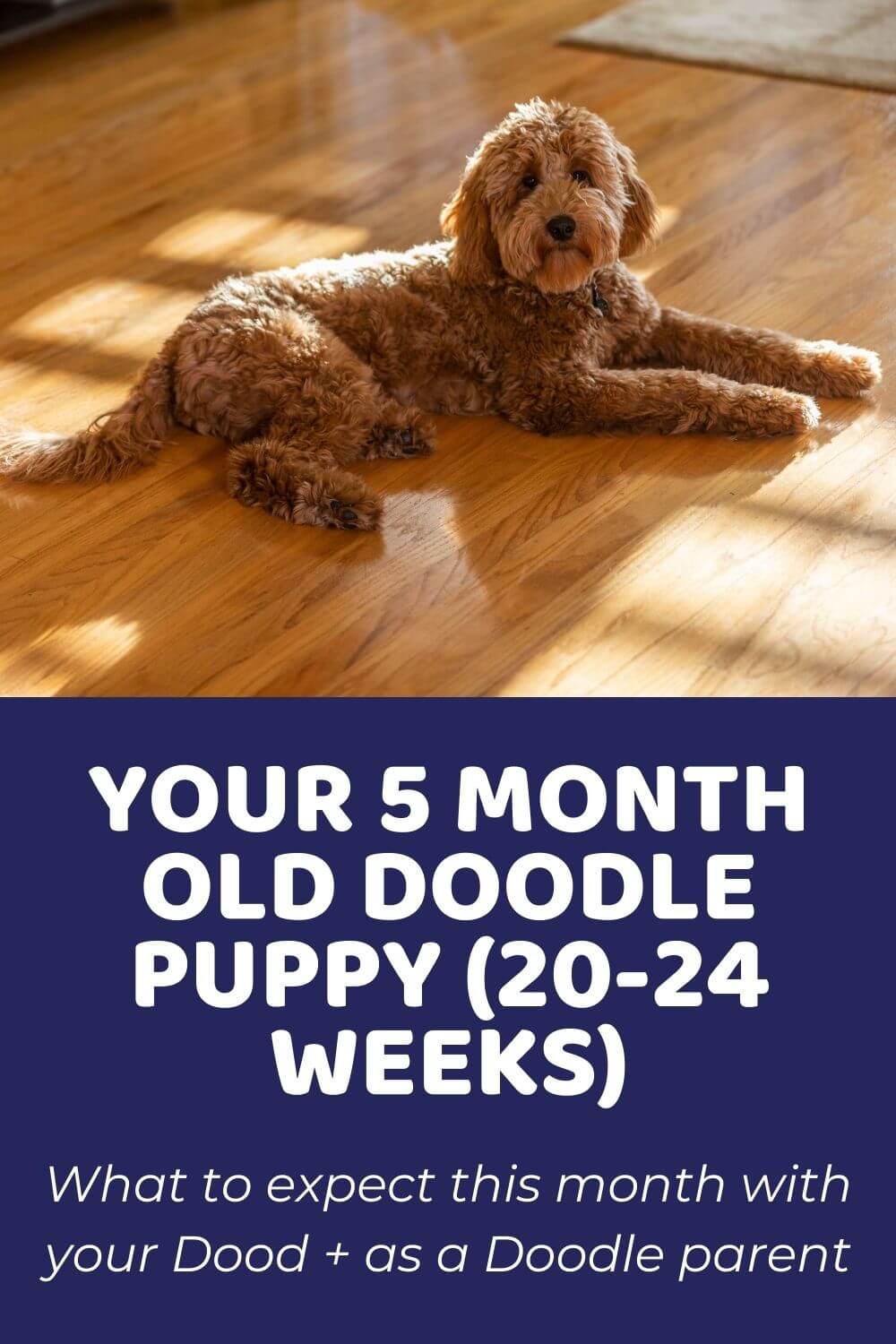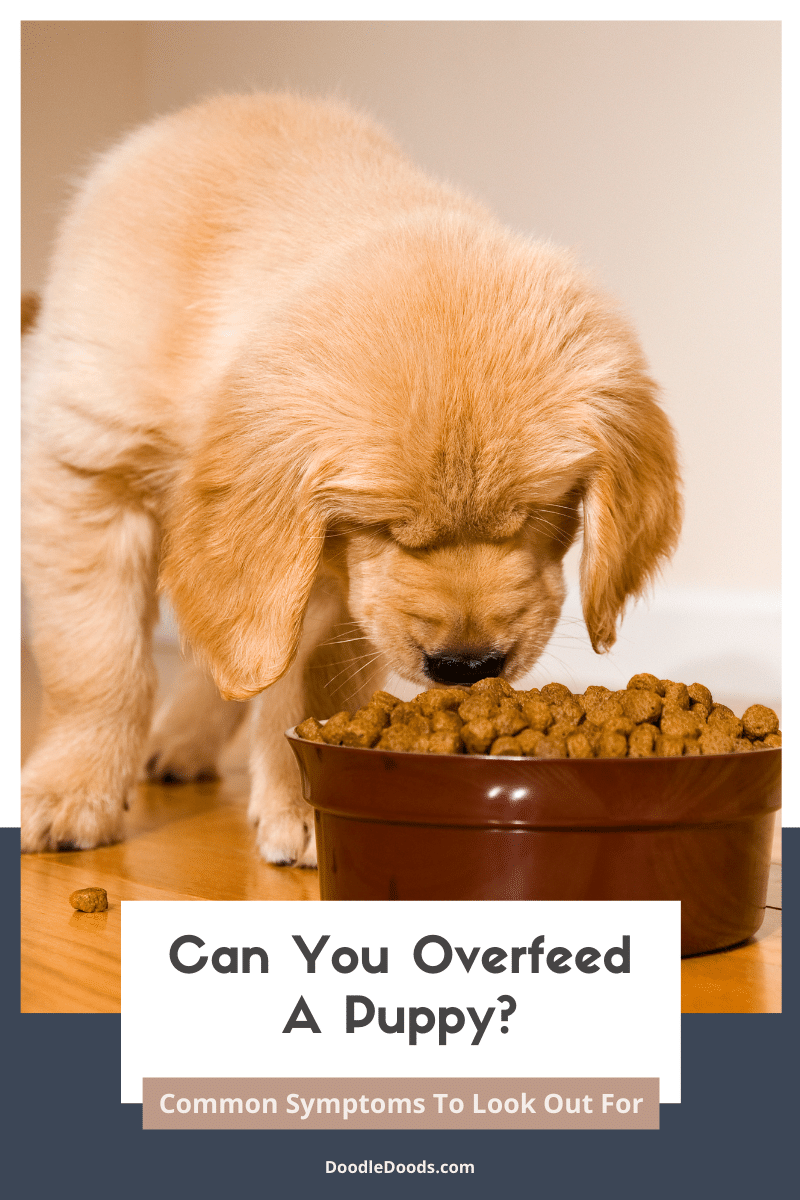Your 7-month old puppy is getting closer and closer to adulthood – but isn’t quite there yet! He continues to grow, mature, and test you each day. Learn about the highlights of your Dood’s development this month – and what you need to know as a Doodle parent.
Your puppy (and you) are in the throes of what I like to call the “little hellion” stage. And I don’t say that lightly! If you thought the early puppy stage was tough, you might be longing for those days now.
I vividly remember those days…Chloe tested my patience so hard, and sometimes I asked myself what I had signed up for. After all, she was the canine equivalent of a “teenager,” so what did I expect?
She was doing all the things that teenagers just love to do (I was no saint as a teen, either!): testing, ignoring me, being disobedient. It was enough to make me want to pull my hair out.
So how did I get past it? Time and patience. And how do you get past it? Also, time and patience. (Hopefully, you have more of those two things than I did back when I was a 19-year-old college student!)
In the meantime, though, it might interest you to learn what to expect this month with your puppy, developmentally, behaviorally, and as a Doodle puppy parent. It just might help you “weather” this stage a little easier!
Learn How to Care for Your Doodle Puppy!
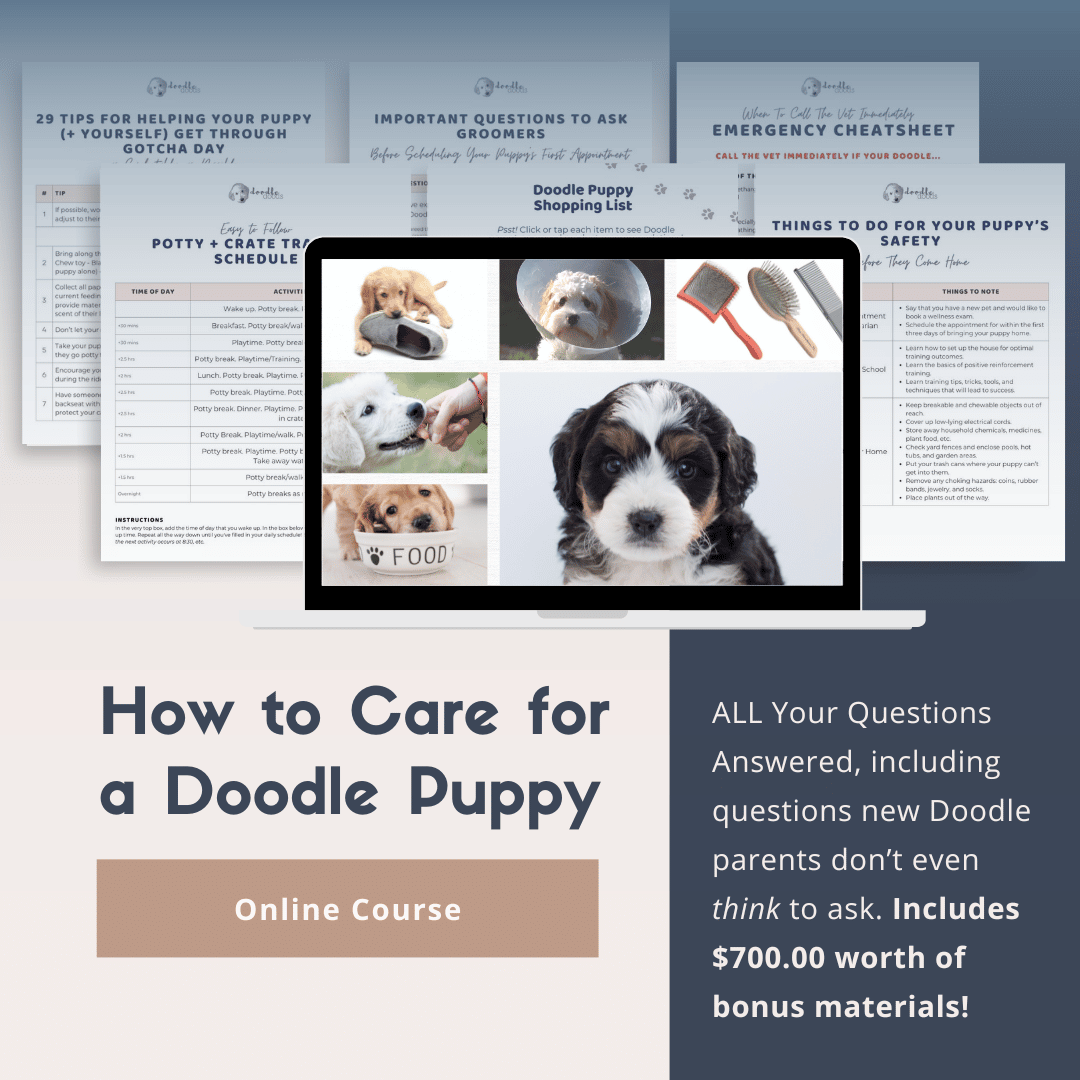
Perfect for first-time Doodle parents, get ALL your questions answered, including questions new Doodle parents don’t even think to ask.
Plus, get $700 worth of Bonus Materials for FREE, including:- Doodle Parenthood Community and Support Group ($190 value)
- Doodle Puppy Growth Tracker ($20 value)
- EMERGENCY Cheatsheet: When To Call The Vet Immediately ($50 value)
- HELP! Button ($145 value)
- And SO MUCH MORE!
The Second Fear Stage (a.k.a. Fear Imprint Stage)
All dogs go through two fear periods. The first one occurs around 8-11 weeks, while the second occurs around 6-18 months. Why is there such a large window when this can occur? Because it tends to happen earlier for smaller dogs and later for bigger dogs.
If you have a small Dood, he’s likely entering his second fear period VERY soon, if he hasn’t already. Large Doodles will probably go through that stage closer to 15-18 months. And expect this to be a stage that seems to appear, disappear, and reappear again for a little bit of time.
Why do puppies go through fear stages?
These periods are natural and normal and have a very useful purpose: to teach dogs an appropriate fight or flight response to dangerous situations. While these may not be AS important now that dogs live with people, they’re extremely important for helping dogs in the wild stay alive.
So, what does it look like? You’ll know it when it happens because your puppy will suddenly become afraid of objects or situations that didn’t scare him in the past. In the second fear stage, it usually applies to situations and objects rather than people.
What should you do if your puppy is suddenly fearful of a new situation? First and most importantly, don’t force him into it. Instead, allow him to investigate, retreat, and come back again in his own time. Praise him.
The process will help him work things out on his own and build self-confidence in his fear/safety instincts.
28-32 Week Old Puppy Growth: Physical And Behavioral Development
Now that you’re past 6 months, you’re firmly in the hellion (a.k.a., teenager) stage now with your 7-month old puppy! Expect him to exhibit new (and sometimes annoying) behaviors as he continues to develop and mature. Here’s what to expect:
7-Month Old Puppy Physical Development
- Your puppy will reach sexual maturity by the end of this month. If you haven’t done so already, consider having him spayed/neutered very soon if he’s a small Doodle (less than 50 lbs), or fairly soon if he’s a large Doodle (over 50 lbs). Check with your vet for specifics about your own 7-month old Dood.
- If he isn’t already spayed/neutered, he will start exhibiting sexual behavior.
- If she hasn’t already, a female puppy will likely go into heat (estrus) by the end of the month, at which time she can easily become pregnant. So keep an eye open now for swelling of her vulva and any discharge.
- This month, you can start adjusting your 7-month old puppy to 2 meals per day. He will continue to need more food as he grows. Be sure you are feeding him puppy food.
- Your Doodle will be growing at an individual growth rate; be sure to keep track of his growth with our Doodle Puppy Growth Tracker!
- Your pup’s body may look a little “lanky” and awkward (but still adorable!) during this timeframe.
- By the end of this month, your puppy will have all 42 of his adult teeth, so teething should be over. He may chew less obsessively but remember, chewing is still normal, so make sure you have plenty of healthy dog chews on hand.
- As your Dood’s adult coat continues to emerge, brush him every day to avoid matting as he starts to shed his puppy coat. Also, trim his nails on a regular basis (each week or every other week).
- Your puppy’s stamina is increasing. By the end of this month, you can start taking him on 30 minute walks each day.
7-Month Old Puppy Behavioral Development
Puppy is a full-fledged adolescent now, and his behavior may show testing behaviors reminiscent of human teenagers. Expect to see:
- A rebellious puppy as he tests his limits.
- Blatantly ignoring cues that he previously knew or acting like he “forgot” his training.
- An increase in energy…and willfulness!
- Destructive behavior. Boredom due to increased energy and confidence is often the cause. Continue to provide lots of opportunities for walks and playtime to keep him entertained.
- Your 7-month old puppy assert himself (and challenge you) more as he explores dominance and his role in the pack.
- A second chewing stage that will likely begin sometime between now and 9 months of age. (it’s not quite over yet!)
- A male showing interest in female dogs, especially those in heat.
- Your Doodle (male or female) going to great lengths to escape the house to mate.
What To Expect As A Doodle Parent
- Even with the best preparation, things may get difficult from time to time during this period. This is not the time to expect model behavior.
- Your puppy may exhibit some destructive chewing that a combination of adolescence and boredom may cause.
- Consult with your vet about getting your Doodle spayed/neutered very soon if he is small (less than 50 lbs).
- Continue to provide safe opportunities for vigorous play and exercise to curb destructive behavior.
- Between now and 12 months of age, your pup may act like he “forgot” his training. Be consistent and firm. Now is a good time to fine-tune obedience training. Continue to have regular obedience training sessions, covering the old basics again, and mixing in newer, more difficult tasks.
- Marking behavior can be curbed more easily if you stop it early. Catch your Dood in the act and redirect him to a more appropriate location.
- Continue to socialize and expose your 7-month old puppy to new experiences, people, places, things, and sounds (this is a lifelong task!)
- Continue to reward your Doodle for calm behavior and ignore him for fearful behavior.
- Enjoy the sweet and adorable moments!
Precautions
- If your puppy is still having major issues with house training, contact your vet for advice; he may have a treatable health issue.
- Be sure that he is safely confined to the house and yard, as he may go to great lengths and escape to mate.
- As he matures, you may start to notice new behavior issues. Don’t assume he will grow out of it; address those issues as soon as possible. If the issues are too hard to correct or manage on your own, consider hiring a dog trainer or behaviorist.
- During your Dood’s occasional lapses of obedience, avoid situations that could have harmful results, such as off-leash work in an unsecured area.
- Do an evaluation once a week on how much you’re feeding your puppy to see if the amount needs to be adjusted.
- Don’t punish your 7-month old puppy. Redirect “bad” behaviors and reward “good” behaviors.
Enjoy This Time With Your 7-Month Old Puppy
Although the puppy stage may sometimes FEEL like it’ll last forever, it really goes by quickly. Enjoy this stage by ignoring your Doodle’s testing behaviors while reinforcing his desired behaviors and continuing with his training.
Find out more about what to expect with your puppy from next month.

